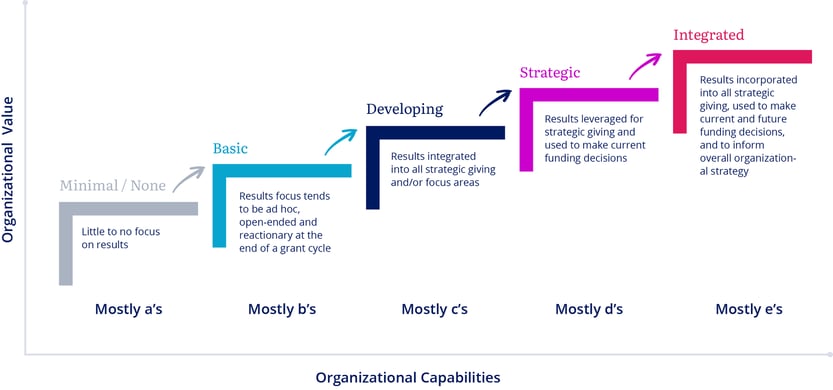October 16, 2020
Results Capacity: How Well Do You Measure?
This is the final part of a content series from Michelle DiSabato that provides important insight into impact measurement. Each piece builds on the last, creating a master guide for CSR and community investment professionals. This resource will be helpful to those looking to determine the impact of their initiatives in the community and on their businesses.
- Read about the four forces driving change in the Corporate Social Responsibility evolution
- Watch an interview with Michelle to learn how to link social impact and business objectives
- Download the Roadmap to Results, an eight-step guide to developing your company’s social impact strategy
Now that you have the background and understand what is driving evolution in the sector, plus the roadmap to get you there, how do you start making the shift to linking your social and business purposes and impact? Like any journey you take — personally or organizationally — it is always good to have a navigational tool to help determine:
- Your current position
- The desired end state (i.e., your goals for your social and business impact)
- The stops or milestones along the way (the Roadmap to Results, or the journey your company will take to get to your desired end state)
Getting started with the Results Capacity Assessment Model
To know your current position, you will need to determine your company’s current capacity to get results for its social programs and how that impacts the overall business. To assist you in this process, we have created the Results Capacity Assessment Model and questionnaire.

The model is organized in a grid with the X-axis (runs from left to right) examining what your company currently does or knows about getting results. For example, do you ask for results from your partners, and if so:
- What type of information do you ask for?
- When do you ask for it?
- Do you have the tools in place to collect the information?
The Y-axis (runs from bottom to top) is the value or level of importance your company places on results. It examines key aspects of your company’s view on results, such as:
- Who is driving the desire for results?
- How is the collected information used? In decision-making? To communicate? To inform future strategy?
It’s time to determine your current capacity
When we think about a company’s maturity related to gathering and acting on results for your social programs (and ultimately your business), those at the beginning or minimal stage place little or no emphasis on results. They basically:
- Fund and engage partners based on employee interest or mission match (e.g., the partner organization’s mission is to “Help students improve their academic performance” and your focus area is education, so that is enough to say they are a match)
- Have leadership that is not engaged on achievement of social programs as they relate to or impact business
- May — or may not — ask for post-grant reports
- Rarely share information about their programs
However, companies at the other end of the grid are more sophisticated and integrate results throughout their organization from strategy to operations, communications, and business policies and practices. At these companies, leadership not only drives these conversations, but supports and integrates them throughout the organization. They use results and data to:
- Inform social and business impact strategies for the overall company, including (but not limited to) development of product lines, hiring practices and work policies
- Fund and engage only with partners whose results are tied to the company’s desired results and impact (both for society and their business)
- Monitor progress throughout the project or program, instead of just at the end
- Use results — both anticipated and actual — to make all funding and engagement decisions
- Roll up and share overall impact internally and externally via annual reports, websites, etc.
The vast majority of companies fall somewhere in between. In fact, based on conversations and feedback from organizations that have applied the assessment tool, around 65% are somewhere in the middle.
Where is your company when it comes to results and impact? Download this questionnaire, which will help you determine your current organizational results capacity, and then be sure to continue your journey through the Roadmap to Results!
Michelle DiSabato, founder and president of Community Impact Consultants, Inc. (CIC), is a philanthropic impact subject matter expert with more than 20 years of experience developing, designing and implementing multi-million-dollar philanthropic initiatives and programmatic social impact analyses. Michelle has worked with a wide array of clients in industries ranging from healthcare and finance to consumer products and entertainment providers, helping them align their giving strategies to meet their business and social responsibility goals, while leveraging and optimizing technology to maximize efficiency. Prior to founding CIC, Michelle was a CSR manager at a Fortune 10 global organization, where she managed one of the largest installed grants management systems (200+ users in more than 15 locations) and led their measurement initiative to determine the impact of their community engagement.

_0%20(1).png)